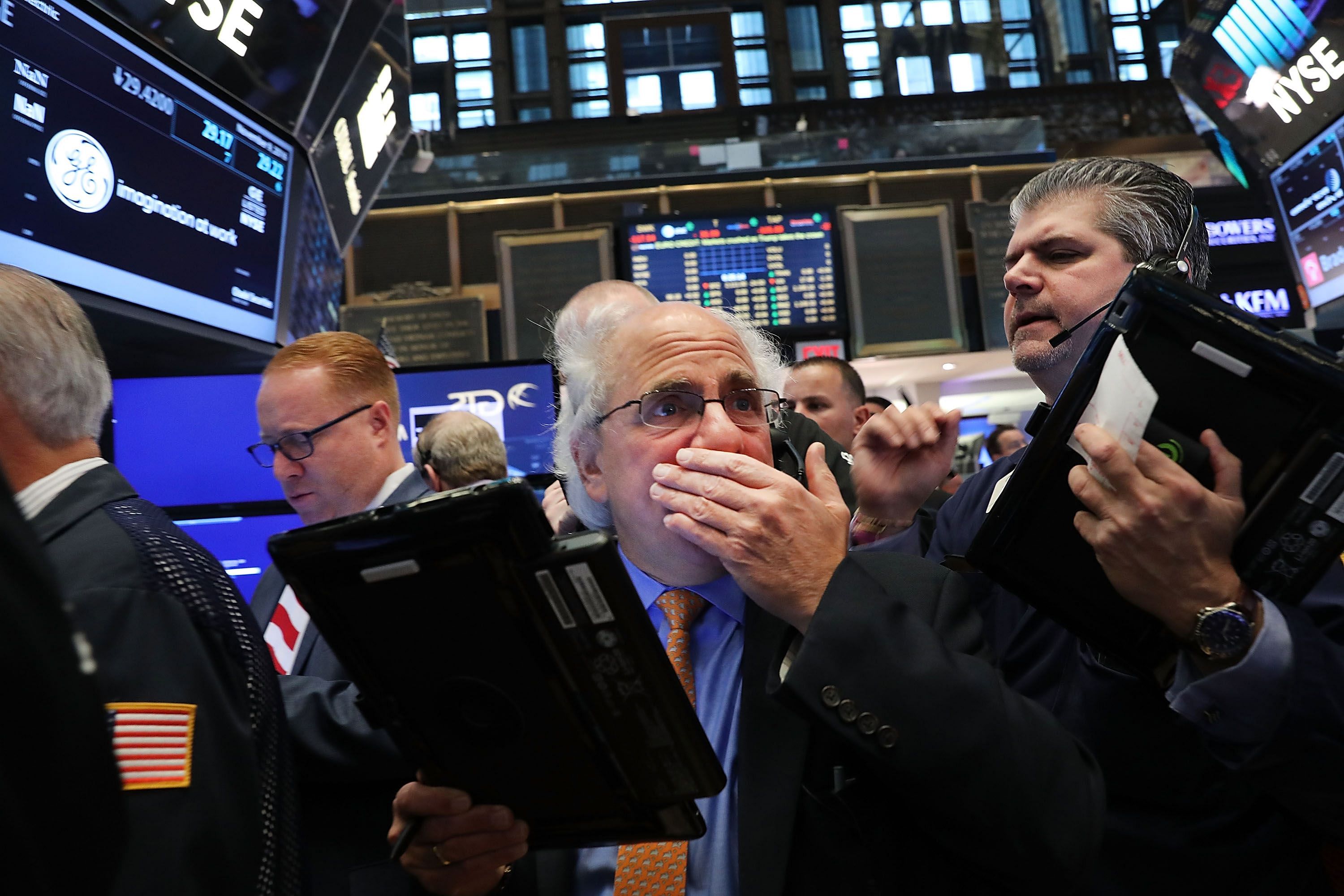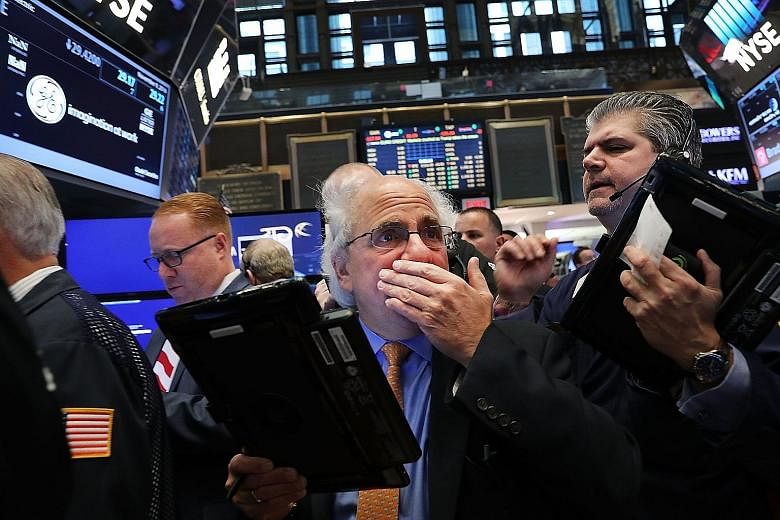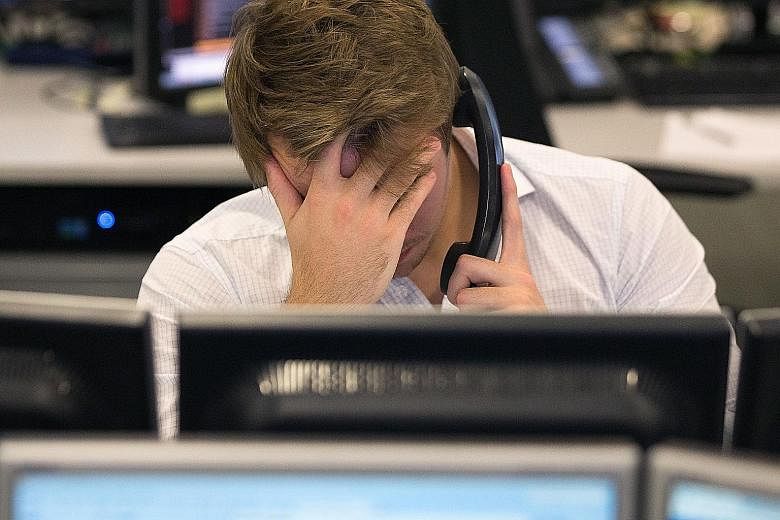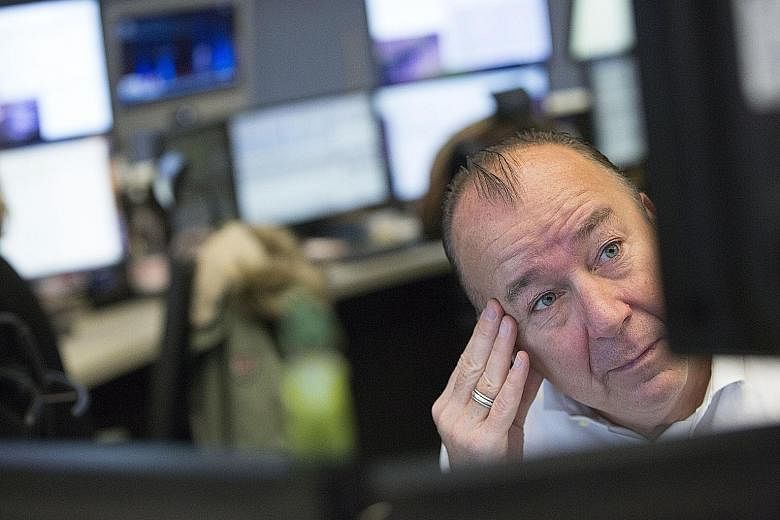The unexpected victory by Republican nominee Donald Trump in the United States presidential election last Tuesday sparked market upheavals and uncertainty around the world. Although some markets have since rallied, the Trump effect could create more uncertainty worldwide than the equally unexpected win by the "Leave" camp during the Brexit vote in June.
To counter the volatility ahead, financial experts are urging retail investors to keep cool and adopt a more defensive stance.
The Sunday Times looks at the impact of the Trump victory and offers tips to retail investors.
MARKET REACTIONS
In the run-up to the election, markets had priced in a Clinton victory, no thanks to misleading polls. No wonder Mr Trump's win was a shock, and led to a knee-jerk sell-off in Asian markets the day after the election and a flight to safety with safe-haven assets such as US government bonds, gold and currencies like the yen and Swiss franc.

By the end of the Asian trading day, stock losses here had been pegged back following a conciliatory victory speech by Mr Trump calling for national unity.

As soon as trading started in Europe and the US last Wednesday morning in those markets, the initial panic had waned and the anticipated meltdown did not materialise.

Mr Daryl Liew, who heads portfolio management at wealth manager Reyl Singapore, said: "Witness the amazing recovery in risk assets after the correction on Wednesday.
"There have also been huge intra-sector moves with various stock markets as investors try to predict which sectors and companies will benefit from the Trump win."
He noted that US bank stocks had rallied strongly last Wednesday, given expectations of decreased regulation and reflation; as had healthcare plays that could have suffered under Democratic nominee Hillary Clinton's threat to impose price controls on drugs. Other key gainers included defence-related names, as military spending could rise under Mr Trump and a US military withdrawal overseas could see greater spending on defence by other nations, added Mr Liew.
In fact, a Trump presidency and a Republican-controlled Congress might spell good news for the US on hopes that the executive and lawmakers will work together to pump-prime the economy.
How Trump's proposals could affect markets
The outlook for the US in the next 12 months may be positive if the President-elect follows through with his proposal to cut taxes (and repatriate overseas corporate profits) and increase spending on infrastructure. The US economy may receive a boost from these reflationary policies, added Mr Liew.

Mr John Doyle, chief investment officer (equities and multi-assets) at UOB Asset Management, noted that financial markets are focusing on the potential fiscal stimulus rather than policy risks.
"With a Republican House and Senate, there is a high chance that Trump's policies, such as lower taxes and major infrastructure project plans, could be passed. This will boost growth numbers in the near term," he said.
STRAITS TIMES INDEX (STI)
Mr Yeo Kee Yan, retail market strategist at DBS Group Research, expects to see a sell-off in equity markets as risk aversion increases.
"A Trump victory, together with a likely continuation of the 'earnings recession' and prospect of a December rate hike, should send the STI lower to 2,670," he said.

However, DBS believes the effect of the US presidential election on the Singapore market is likely to be short-term. After all, the US contributes to just 9 per cent of Singapore's non-oil domestic exports.
Come next year, the STI could recover above the 3,000 mark as the economy improves, Mr Yeo added.
ASSET CLASSES
The short- and medium-term impact may be quite different, depending on what Mr Trump does by way of policy.
In the short term, his victory would lead to weaker equity markets. Exporter stocks with considerable business dealings in countries such as China and emerging markets could be hardest hit by the sell-off action, given Mr Trump's disdain for free trade, advised Mr Vasu Menon, OCBC Bank's senior investment strategist.
Meanwhile, the prospects of generous fiscal stimulus and limited regulatory burdens would be a welcome reprieve to other sectors such as financial services, energy, infrastructure, industrials and consumer discretionary, at least on a relative basis.
Mr Menon said: "In the medium term, if Mr Trump pushes through with some of his proposed radical economic policies, especially tax cuts and spending increases, it could boost the US domestic economy, which may be modestly positive for equities, but negative for inflation and bonds.
"Mr Trump's expansionary fiscal policy may spur growth but it could also fuel inflation and lead to higher-than-anticipated interest rates in the US which could hurt bond markets. The stronger US dollar which could accompany the higher interest rates could also cap commodity prices in the medium term."
Reyl Singapore's Mr Liew said that US equities appear to be the initial beneficiaries on expectations of a pick-up in economic activity and a potential boost to earnings due to tax cuts.
Commodities could also benefit with the rise in infrastructure spending and Mr Trump's more favourable views on shale energy. However, US treasuries could suffer the most in this inflationary environment, especially since the US fiscal deficit will likely rise under Mr Trump owing to increased spending, he added.
The outlook for emerging markets is more uncertain as Mr Trump's potentially protectionist measures could hurt export-dependent economies.
A stronger US dollar and higher interest rates will also add headwinds for emerging markets equities, said Mr Doyle.
US FED INTEREST RATE HIKE Prior to the US presidential election, US Federal Reserve officials had provided strong signals that a December rate hike is likely.
Last Wednesday, analysts had initially said that if markets here and across the world continued to fall in the wake of the Trump victory, the Fed may delay its widely anticipated interest rate hike next month, a move that could then boost equities and currencies.
This sentiment has since changed with the market recovery last Thursday, which revived expectations that the Fed will raise interest rates next month.
Mr Doyle said: "The bond market saw yields rising in the aftermath of the election results and this could indicate a high probability that the Fed is on track to raise policy rates in December."
TRADE AGREEMENTS
UOB senior economist Alvin Liew thinks that a Trump presidency could be negative for US-Asia trade.
"Trump had pledged to renegotiate free trade agreements on the campaign trail, and the Trans-Pacific Partnership (TPP) agreement certainly looks most at risk.
"The President-elect's inward- looking and protectionist views would certainly have negative implications on Asian growth, though it is too early to determine the extent of the impact. Economies with a high proportion of trade dependence would be particularly vulnerable," he said.
The TPP is a free trade pact that the US signed with 11 Pacific Rim nations, including Singapore. The US has not ratified the TPP and Mr Trump has vowed he will not do so. With the TPP, Singapore would have been able to enjoy lower tariff and non-tariff barriers for both goods and services.
Reyl Singapore's Mr Liew pointed out the impact of greater protectionism would be a hit to global trade and this would affect most of Asia.
"Being an open economy, Singapore will be hard hit by this change in paradigm. It appears that Trump will have the prerogative to re-negotiate the US' participation or withdrawal in Nafta (North American Free Trade Agreement) and it also appears that TPP is dead in its current form," he added.
What could happen is that Asia could see increased regionalisation as Asian countries develop closer trade ties with the region, and with China, UOB's Mr Liew added.
MODEST US FISCAL POLICIES AND HIGH PROBABILITY OF TRADE WARS
While it is too early to predict the impact of a Trump presidency on markets, there are already a few broad indicators regarding the direction of the new administration, noted ABN Amro Bank.
"Mr Trump's key policies focus on immigration, taxes and trade. Economic growth and a pro-business agenda are also expected to be emphasised, with increased fiscal stimulus, focusing on infrastructure and energy, and lower taxes.
"We expect policies in these areas may provide additional momentum for corporate earnings growth in 2017," said ABN Amro.
Mr Doyle noted that domestically focused US companies are likely to fare better than export-oriented ones. In addition, Mr Trump's proposed cuts to personal and corporate taxes are very likely to raise consumer spending, thus benefiting consumer stocks.
Mr Keith Wade, Schroders' chief economist and strategist, said that President-elect Trump's fiscal policies will cut taxes, but will most likely lead to higher interest rates, inflation and a bigger budget deficit. However, Schroders expects Congress to temper the new president's fiscal plans, while he will have more freedom on trade.
"Consequently, we are likely to see modest fiscal stimulus and a trade war break out as the president raises tariffs on China and Mexico, " noted Mr Wade.
The net effect is that after a brief boost from tax cuts, the economy will cool as inflation and interest rates rise. With higher tariffs pushing up prices and wages rising as immigrant labour supply falls, the overall outcome is likely to be stagflation, that is, weaker growth and higher inflation, added Mr Wade.
US DOLLAR
Thanks to Singapore's policy of managing the exchange rate against a basket of currencies, the Singdollar ended Friday's session at S$1.41 against the US dollar.
"Many do not discount markets calming down soon, like they did after the results of the Brexit referendum. After all, Trump's inauguration is still some time away on Jan 20 next year.
"The longer-term question for the US dollar is whether it will keep rising with US rates on the recovery, or eventually falter on higher rates from wider deficits and debt," said Mr Philip Wee, senior currency strategist at DBS Group Research.
Mr Doyle believes that the US dollar should also see support from US policy direction in the short term as growth and inflation figures scale upwards alongside a revamped tax code designed to attract capital inflows to the US. This will benefit US equities.




